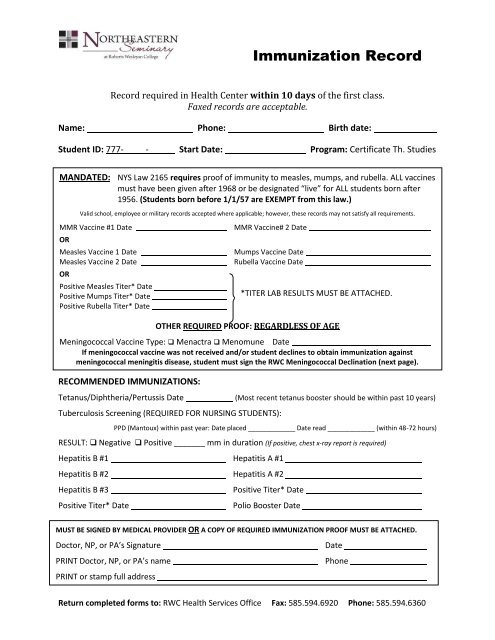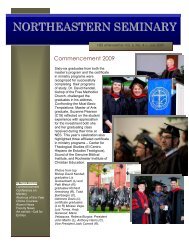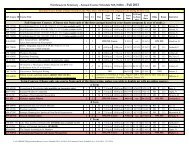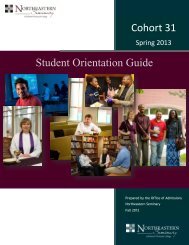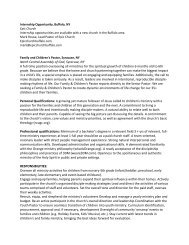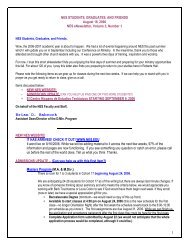Immunization Forms
Immunization Forms
Immunization Forms
Create successful ePaper yourself
Turn your PDF publications into a flip-book with our unique Google optimized e-Paper software.
<strong>Immunization</strong> Record<br />
Record required in Health Center within 10 days of the first class.<br />
Faxed records are acceptable.<br />
Name: Phone: Birth date:<br />
Student ID: 777- - Start Date: Program: Certificate Th. Studies<br />
MANDATED: NYS Law 2165 requires proof of immunity to measles, mumps, and rubella. ALL vaccines<br />
must have been given after 1968 or be designated “live” for ALL students born after<br />
1956. (Students born before 1/1/57 are EXEMPT from this law.)<br />
Valid school, employee or military records accepted where applicable; however, these records may not satisfy all requirements.<br />
MMR Vaccine #1 Date<br />
OR<br />
Measles Vaccine 1 Date<br />
Measles Vaccine 2 Date<br />
OR<br />
Positive Measles Titer* Date<br />
Positive Mumps Titer* Date<br />
Positive Rubella Titer* Date<br />
MMR Vaccine# 2 Date<br />
Mumps Vaccine Date<br />
Rubella Vaccine Date<br />
*TITER LAB RESULTS MUST BE ATTACHED.<br />
RECOMMENDED IMMUNIZATIONS:<br />
Tetanus/Diphtheria/Pertussis Date<br />
Tuberculosis Screening (REQUIRED FOR NURSING STUDENTS):<br />
(Most recent tetanus booster should be within past 10 years)<br />
PPD (Mantoux) within past year: Date placed _____________ Date read _____________ (within 48-72 hours)<br />
RESULT: Negative Positive _______ mm in duration (If positive, chest x-ray report is required)<br />
Hepatitis B #1 Hepatitis A #1<br />
Hepatitis B #2 Hepatitis A #2<br />
Hepatitis B #3<br />
Positive Titer* Date<br />
OTHER REQUIRED PROOF: REGARDLESS OF AGE<br />
Meningococcal Vaccine Type: Menactra Menomune Date<br />
If meningococcal vaccine was not received and/or student declines to obtain immunization against<br />
meningococcal meningitis disease, student must sign the RWC Meningococcal Declination (next page).<br />
Positive Titer* Date<br />
Polio Booster Date<br />
MUST BE SIGNED BY MEDICAL PROVIDER OR A COPY OF REQUIRED IMMUNIZATION PROOF MUST BE ATTACHED.<br />
Doctor, NP, or PA’s Signature<br />
Date<br />
PRINT Doctor, NP, or PA’s name<br />
Phone<br />
PRINT or stamp full address<br />
Return completed forms to: RWC Health Services Office Fax: 585.594.6920 Phone: 585.594.6360
Meningococcal Meningitis<br />
Vaccination Declination Form<br />
Statement required in Health Center within 10 days of the first class.<br />
Faxed statements are acceptable<br />
NYS Public Health Law §2167 requires ALL NYS COLLEGES and UNIVERSITIES to obtain a signed<br />
declination statement from ALL STUDENTS (regardless of age) enrolled for at least six credit<br />
hours who have not received a meningococcal meningitis vaccine within the past five years. The<br />
law also states, “No institution shall permit any student—regardless of birth date or<br />
classification—to attend classes in excess of 30 days without complying with this law”.<br />
Name: Phone: Birth date:<br />
Address:<br />
Program/Division: NES Certificate in Theological Studies (CTS)<br />
I have read or have had explained to me the information regarding meningococcal meningitis<br />
disease (see next page of this form). I understand the risks of not receiving the vaccine. I have<br />
decided that I will not obtain immunization against meningococcal meningitis disease.<br />
Signed<br />
Date<br />
Return completed forms to: RWC Health Services Office Fax: 585.594.6920 Phone: 585.594.6360
Meningococcal Meningitis<br />
Vaccination Declination Form<br />
NEW YORK STATE DEPARTMENT OF HEALTH<br />
Bureau of Communicable Disease Control<br />
What is meningococcal disease? Meningococcal disease is a severe bacterial infection of the bloodstream or meninges<br />
(a thin lining covering the brain and spinal cord) caused by the meningococcus germ.<br />
Who gets meningococcal disease? Anyone can get meningococcal disease, but it is more common in infants and<br />
children. For some adolescents, such as first year college students living in dormitories, there is an increased risk of<br />
meningococcal disease. Every year in the United States approximately 2,500 people are infected and 300 die from the<br />
disease. Other persons at increased risk include household contacts of a person known to have had this disease,<br />
immune-compromised people, and people traveling to parts of the world where meningococcal meningitis is prevalent.<br />
How is the meningococcus germ spread? The meningococcus germ is spread by direct close contact with nose or throat<br />
discharges of an infected person.<br />
What are the symptoms? High fever, headache, vomiting, stiff neck, and a rash are symptoms of meningococcal disease.<br />
The symptoms may appear 2 to 10 days after exposure, but usually within 5 days. Among people who develop<br />
meningococcal disease, 10-15% dies, in spite of treatment with antibiotics. Of those who live, permanent brain damage,<br />
hearing loss, kidney failure, loss of arms or legs, or chronic nervous system problems can occur.<br />
What is the treatment for meningococcal disease? Antibiotics, such as penicillin G or ceftriaxone, can be used to treat<br />
people with meningococcal disease.<br />
Should people who have been in contact with a diagnosed case of meningococcal meningitis be treated? Only people<br />
who have been in close contact (household members, intimate contacts, health care personnel performing Mouth-tomouth<br />
resuscitation, day care center playmates, etc.) need to be considered for preventive treatment. Such people are<br />
usually advised to obtain a prescription for a special antibiotic (rifampin, ciprofloxacin, or eftriaxone) from their<br />
physician. Casual contact, as might occur in a regular classroom, office, or factory setting, is not usually significant<br />
enough to cause concern.<br />
Is there a vaccine to prevent meningococcal meningitis? In February 2005, the CDC recommended a new vaccine known<br />
as Menactra for use to prevent meningococcal disease in people 11-55 years of age. The previously licensed version of<br />
this vaccine, Menomune, is available for children 2-10 years old and adults older than 55 years. Both vaccines are 85%<br />
to 100% effective in preventing the 4 kinds of the meningococcus germ (types A, C, Y, W135).<br />
These 4 types cause about 70% of the disease in the United States. Because the vaccines do not include type B, which<br />
accounts for about one-third of cases in adolescents, they do not prevent all cases of meningococcal disease.<br />
Is the vaccine safe? Are there adverse side effects to the vaccine? Both vaccines are currently available and both are<br />
safe and effective vaccines. However, both vaccines may cause mild and infrequent side effects, such as redness and pain<br />
at the injection site lasting up to two days.<br />
Who should get the meningococcal vaccine? The vaccine is recommended for all adolescents entering middle school<br />
(11-12 years old) and high school (15 years old), and all first year college students living in dormitories. However, the<br />
vaccine will benefit all teenagers and young adults in the United States. Also at increased risk are people with terminal<br />
complement deficiencies or asplenia, some laboratory workers, and travelers to endemic areas of the world.<br />
What is the duration of protection from the vaccine? Menomune, the older vaccine, requires booster doses every 3 to<br />
5 years. Although research is still pending, the new vaccine, Menactra, will probably not require booster doses.<br />
How do I get more information about meningococcal disease and vaccination? Contact your physician or your student<br />
health service. Additional information is also available on the websites of the New York State Department of Health,<br />
www.health.state.ny.us; the Centers for Disease Control and Prevention www.cdc.gov/ncidod/diseases/index.htm; and<br />
the American College Health Association, www.acha.org


